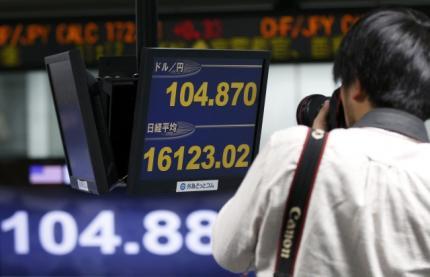Stocks modestly lower on Wall St decline; Aussie dollar plun
Bareksa • 17 Jan 2014

News photographer takes pictures of monitors displaying the Japanese yen's exchange rate against the U.S. dollar (REUTERS/Toru Hanai)
U.S. dollar pares post-data losses
Reuters - A measure of global equity markets edged slightly lower on Thursday, pressured by a decline in Wall Street following a batch of disappointing corporate results while the Australian dollar plunged on the possibility of another interest rate cut.
The U.S. dollar pared some of its early losses by afternoon trade in New York. The dollar index had hit a session low of 80.772 in the morning following data showing a jump in U.S. continuing jobless claims.
The Australian dollar tumbled against the U.S. dollar to its lowest since August 2010 after a surprise fall in Australian employment raised the possibility of another rate cut from the Reserve Bank of Australia.
On Wall Street, the S&P 500 retreated from the previous session's record high after earnings from Goldman Sachs and other banks disappointed investors.
Financials were the biggest drag on the market after both Goldman Sachs Group Inc and Citigroup Inc reported that lower bond trading revenue took a bite out of their quarterly profits. Goldman's earnings fell 21 percent and Citigroup's profit missed expectations.
Goldman's stock slid 2 percent to $175.17. It was the biggest drag on the Dow. Citigroup's stock dropped 4.4 percent to end at $52.60 and was the biggest negative for the S&P 500. The S&P financial sector index fell 0.6 percent, making it the biggest loser among the 10 sectors in the S&P 500.
Analysts said that given the S&P 500's gain of 30 percent last year, the market does not need much of a catalyst for selling.
"You get a day like today with a little disappointment following a day when the market was up big, and we get a sell-off like this," said Bucky Hellwig, senior vice president of BB&T Wealth Management in Birmingham, Alabama.
After a lackluster start to the new year on concerns stock valuations may be over-extended, the S&P 500 had rallied 1.6 percent in the prior two sessions to set its first record high since Dec. 31.
The Dow Jones industrial average fell 64.93 points or 0.39 percent, to end at 16,417.01. The S&P 500 slipped 2.49 points or 0.13 percent, to finish at 1,845.89. The Nasdaq Composite added 3.805 points or 0.09 percent, to close at 4,218.688.
The MSCI all-country world index was down 0.1 percent at 406.95.
Treasuries prices gained after inflation data came in as expected and amid strength in German government debt and overnight demand for safe-haven U.S debt.
Data showed U.S. consumer prices rose the most in six months in December but were in line with expectations, after producer price data on Wednesday surprised some investors by rising more than expected.
"Global inflation is very tame and not problematic, and that's been a factor that's allowed yields to fall this year," said Kim Rupert, managing director for fixed income analysis at San Francisco-based Action Economics.
Benchmark 10-year Treasuries were last up 11/32 in price to yield 2.845 percent, down from 2.884 percent late on Wednesday. Thirty-year bonds gained 18/32 in price to yield 3.774 percent, down from 3.806 percent.
AUSSIE TUMBLES
The Australian dollar tumbled against the U.S. dollar to its lowest since August. The Aussie fell as low as US$0.8777, and was last down 1.12 percent at US$0.08814, continuing a weeklong trend of weakness.
The Reserve Bank of Australia has been signaling it would rather not ease again from the current record low of 2.5 percent.
"People were already selling into the bounce before we got to today, and I think today's numbers just pushed people in the direction that they were already going," said Marc Chandler, director of currency strategy at Brown Brothers Harriman.
The dollar index hit a session low of 80.772 in the morning and was last down 0.13 percent at 80.924. Despite the dip, analysts said the uptrend was still intact for the greenback.
The euro was last up 0.08 percent to $1.3614, while the dollar slid 0.21 percent to 104.33 yen, according to Reuters data.
European equities edged down to just below a 5-1/2-year high, hurt by a string of losses in the retail sector after corporate reports, though mining stocks offered some support.
In commodities markets, crude oil futures ended slightly lower in thin trade as expectations of more supply from the Middle East and North Africa weighed against news of lower oil output from OPEC.
Brent crude for February delivery LCOc1 expired down 4 cents at $107.09 a barrel, after settling 74 cents higher on Wednesday. Brent March crude oil LCOH4, which becomes the front month on Friday, settled down 52 cents at $105.75 a barrel.